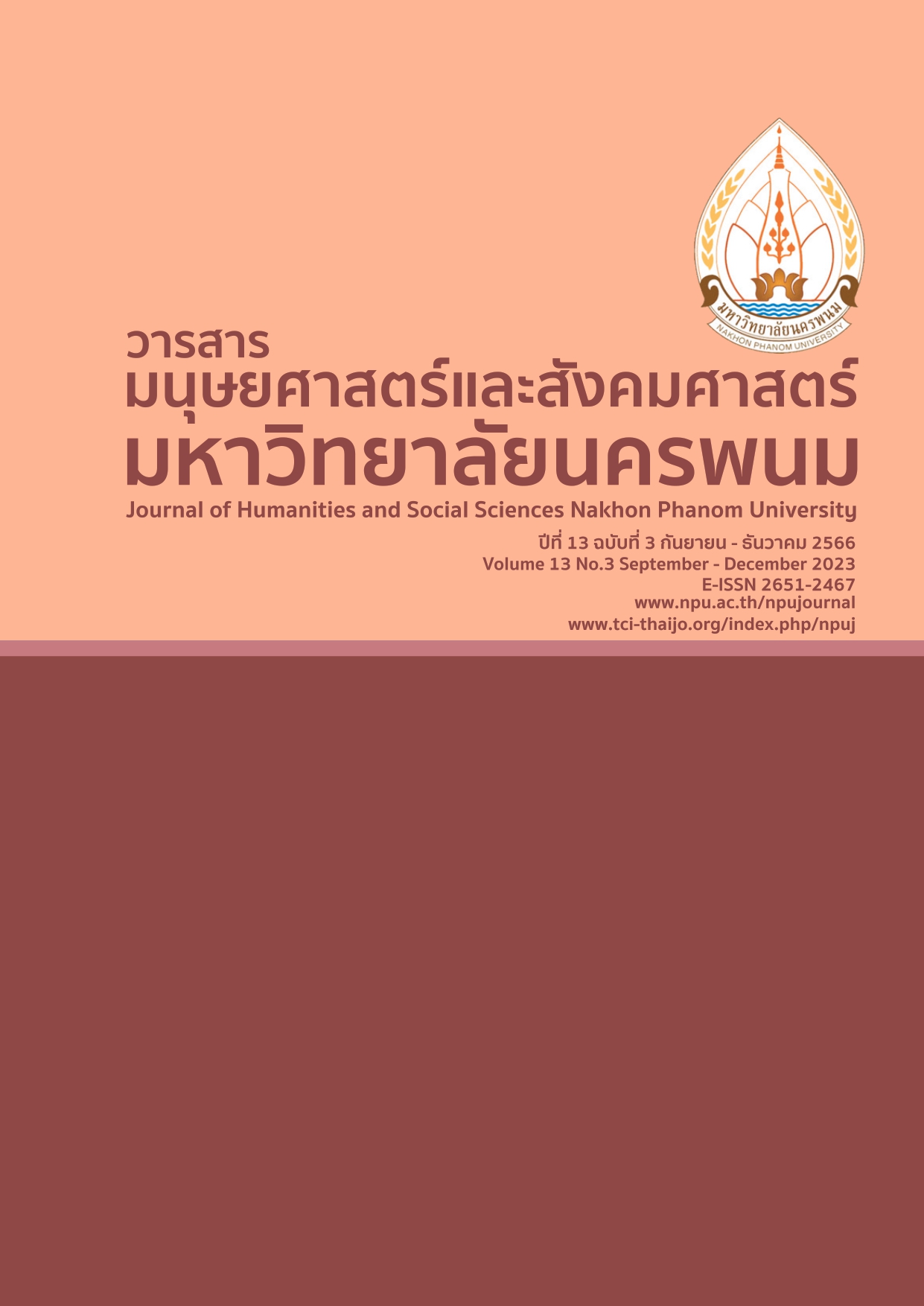A Study of Teacher’s Competency for Conducting a Professional Development Program at a Catholic School in Thailand Using the Southeast Asia Teachers Competency Framework
Main Article Content
Abstract
This research aimed to study the competency of teachers at a Catholic school in Thailand using Southeast Asia Teachers Competency Framework (SEA-TCF) as regional standardize measurement. The research divided into 2 phases: to investigate the level of teachers’ competency according to the framework, and to conduct the professional development program for improving the teachers’ competency. The sample group of the study consisted of 179 Thai and foreign teachers. The instrument used for data collecting was the Self-Rating Competency Checklist. The Confirmatory factor analysis (CFA) was used to construct the instrument quality. The over al reliability was at Cronbach's a of .942. The research results showed the level of teachers' competency in 4 aspects from the highest to the lowest respectively: becoming a better teacher every day (= 3.26), support and help students to learn (= 3.04), the community was engaged (= 2.99), and know and understand what to teach (= 2.92). The average of the 4 groups of competency was at the level that the teachers are able to do very well’ (= 3.05). In the second phase was a professional development program which conducted according to the result that found that the level of teachers’ competency need improvement. The result from testing pre and post-activity using a paired samples t-test found that the score was significantly different: pre-activity (= 2.17, S.D. = .88) and post-activity (= 3.88, S.D. = .61) when t(159) =-32.94, p=.00. This showed that the Self-Rating Competency Checklist using the SEA-TCF was a helpful tools for identifying areas of teacher improvement so the school can provided suitable professional development activities and can also create a collaboration and knowledge sharing between teachers and school staff
Article Details

This work is licensed under a Creative Commons Attribution-NonCommercial-NoDerivatives 4.0 International License.
References
Abelardo, L. J., Lomboy, M. A. A., Lopez, C. C., Balaria, F. E. and Subia, G. S. (2019). Challenges encountered by the national high school teachers in doing action research. International Journal of English, Literature and Social Science (IJELS). 4(4),1046-1051
Artacho, E. G., Martinez, T. S., Martin, J. L. O., Marin, J. A. M., and Garcia, G. G. (2020). Teacher training in lifelong learning-the importance of digital competence in the encouragement of teaching innovation. Sustainability. 12(7),2852. https://doi:10.3390/su12072852
Bubb, S. and Earley, P. (2007). Leading and managing continuing professional development: Developing people, developing schools. London : Paul Chapman Publishing.
Cagaanan, J. C. A. and Gosadan, B. D. (2018). Research Competency among Elementary School Teachers: An Evaluative Assessment for School-Based Action Research (SBAR). JPAIR Institutional Research. 11(1), 51-64. doi:https://doi.org/10.7719/irj.v11i1.590
Day, C. (1999). Developing teachers: The challenges of lifelong learning. London : The Falmer Press.
Field, A. (2013). Discovering statistics using IBM SPSS statistics and sex and drugs and rock ‘N’ roll. (4th ed). California: Sage Publications.
Gefen, D., Straub, D., and Boudreau, M. C. (2000). Structural equation modeling and regression: Guidelines for research practice. Communication of AIS. 4(7),2-77.
Hamdoud, A. (2020). The Incorporation of Action Research into Teacher Education: Perspectives and Challenges (A Case Study of Teachers and MA Students in ENS-Bouzareah). Uluslararası Güncel Eğitim Araştırmaları Dergisi. 6(2),615-630.
Heineke, A. J. and Giatsou, E. (2020). Learning from students, teachers, and school: Field-based teacher education for emergent bilingual learners. Journal of Teacher Education. 7(1),148-161. doi:10.1177/ 0022487119877373
Irwandi, Khairuddin, Alwi, N. A., and Helsa, Y. (2019, October). Classroom action research for improving teacher's professionalism. In Journal of Physics: Conference Series. 1321(2),022093. IOP Publishing. doi:10.1088/1742-6596/1321/2/022093
Istiqomah, A.N., Suyatno and Maryani, I. (2019). The effect of teacher competencies on student achievement in vocational high school. International Journal of Education. 11(4),1-16. doi:10.5296/ije.v11i4. 15625.
Joyce, B. and Calhoun, E. (2010). Models of Professional Development: A celebration of educators. Thousand Oaks, California : Corwin.
Lane, C. A. (2022). Handbook of Research on Acquiring 21st Century Literacy Skills Through Game-Based Learning. Vol 2. Hershey, PA : IGI Global.
Meesuk, P., Sramoon, B. and Wongrugsa, A. (2020). Classroom action research-based instruction: The sustainable teacher professional development strategy. Journal of Teacher Education for Sustainability. 22(1),98-110.
Mhunpiew, N., Dan, Y. and Unarat, P. (2021). The Construct Reliability and Validity of the Thai Version of the Southeast Asia Teachers Competency Framework (T-SEA-TCF). Rangsit Journal of Educational Studies. 8(1),13-25.
Podungge, R., Rahayu, M, Setiawan, M. and Sudiro, A. (2020). Teacher Competence and Student Academic Achievement. Advances in Economics, Business and Management Research, vol 144: Proceedings of the 23rd Asian Forum of Business Education (AFBE 2019). Atlantis press. doi:10.2991/aebmr.k. 200606.011
Scheerens, J. (2010). Teachers' professional development: Europe in international comparison. An analysis of teachers' professional development based on the OECD's Teaching and Learning International Survey (TALIS). Luxembourg : Office for Official Publications of the European Union.
Southeast Asian Minister of Education, Organization, Innovation and Technology (SEAMEO INNOTECH. (2010). Teaching competency standards in Southeast Asian Countries: Eleven country audit. Philippine: SIREP-SEAMEO INNOTECH Regional Education Project series.
Southeast Asian Minister of Education, Organization, Innovation and Technology (SEAMEO INNOTECH), Southeast Asian Ministers of Education Organization (SEAMEO), and Teachers' Council of Thailand. (2018). Southeast Asia Teachers Competency Framework (SEA-TCF). Retrieved October 2022 from https://www.ksp.or.th/ksp2018/wp-content/uploads/2019/10/SEA-TCF-BOOK-ENG.pdf
Shidiq, G. A., Promkaew, S. and Faikhamta, C. (2022). Trends of competencies in teacher education from 2015 to 2020: A systematic Review Analysis. Kasetsart Journal of Social Sciences. 43(2022),257-264. https://doi.org/10.34044/j.kjss.2022.43.1.35
Spencer, L. M. and Spencer, S. M. (1993). Competence at Work: Models for Superior Performance. John Wiley & Sons, Inc.
Wright, B. D. And Masters, G. N. (1982). Rating Scale Analysis. Chicago: MESA Press.


